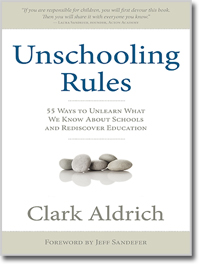Those of us in the learning and performance field are always on the lookout for fresh approaches to engage our adult audiences. Mobile learning apps, eLearning simulations, game-based training — for some, the more cutting-edge, the better. But what about the K-12 educational system?
 Is anyone
thinking about new approaches to improve how we reach an entire generation of
younger learners? Clark Aldrich certainly is. In Unschooling Rules, Aldrich presents 55 powerful and provocative
ways to unlearn what we know about today’s schools and change the conversations
that will redefine the education landscape in America.
Is anyone
thinking about new approaches to improve how we reach an entire generation of
younger learners? Clark Aldrich certainly is. In Unschooling Rules, Aldrich presents 55 powerful and provocative
ways to unlearn what we know about today’s schools and change the conversations
that will redefine the education landscape in America.
Unschooling Rules is organized around Aldrich’s “Seven Cs of Education”:
- Curricula: the selection
- Content: the pieces
- Coaching: the adult
- Customization: the flexibility
- Community: the peers
- Credit: the documentation
- [Day] Care: the place
From the outset, the tone of the book is defined with the first “rule” – learn to be; learn to do; learn to know. During childhood, we must learn to be (helping understand who we are and who we want to be), learn to do (focusing on developing the skills of application), and learn to know (focusing on knowledge). Learning to know, Aldrich argues, is the strength of today’s traditional schools, but is only useful after learning to be and learning to do have begun. Furthermore, what we really need to know is quite fundamental and formed the basis of education for our parents and grandparents – the building blocks of reading, writing, and arithmetic. In addition to this core curriculum, Aldrich lists 25 critical skills that should be essential to any high school curriculum (Rule 4) – skills such as ethical behavior, leadership, conflict management, problem solving, negotiation, and communications introduced in high school would most certainly impact today’s business world.
Expose more, teach less.
Aldrich argues that we all “unschool” to learn most of our knowledge; the only variables are how well we do it and when we start. So rather than teaching more lessons in classrooms that help students learn only how to be students in classrooms, we should find ways to leverage technology, the natural world, internships, and microcosms (e.g., fish tanks, lemonade stands, team sports) to help today’s students learn. Key to this approach is finding time for reflection, both before and after the learning activities take place. Yes, some may disagree with using Facebook as a learning tool; but being able to connect with people around the corner – and around the globe – is easier now more than ever. Finding ways to explore the world around them, talk with and observe experts, and generally nurture a child’s individual interests leads to discoveries of passions, interests, and, ultimately, more meaningful learning.
Adults, too, must embrace this new model of learning. Children look to adults as role models, and, as Aldrich suggests, adults should accept this responsibility, act accordingly, and find ways to nurture these relationships that might blossom into apprentice and/or mentor models over time.
Why should you read this book?
Simply put, you should read Unschooling Rules if you’re curious about how something as massive and, at times, as rigid, as the educational system in the U.S. could undergo a substantial transformation. Parents, teachers, administrators, policy makers, business leaders – really, anyone who knows and loves a child – can walk away with ideas and approaches to rediscover education as it could be. Some of the rules may seem idealistic; others completely impossible. Yet, Aldrich balances his worldview with real-world sensibilities – Rule 19, “Have a well-stocked library” and Rule 46, “The future is portfolios, not transcripts” – that few could argue. And even if you don’t agree with everything Aldrich posits, you will most assuredly think differently about some things.
A few topics within the book are somewhat underdeveloped, and others are overlooked entirely (e.g., providing appropriate, contextualized learning for children with special needs or learning disabilities), but Unschooling Rules provides food for thought for anyone who wants the absolute best learning environments for our children today.
Aldrich closes with a list of “Places to Start” – specific rules described in the book that have direct implication for school administrators, parents of children in traditional schools, and policy makers. For ongoing news and more information, visit www.unschoolingrules.com.
Bibliographic information
Aldrich, Clark. (2011) Unschooling Rules: 55 Ways to Unlearn What We Know About Schools and Rediscover Education. Austin, TX: Greenleaf Book Group Press. eSBN: 978-1-60832-152-0. 89 pages.

